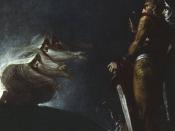The Elizabethan Concept of the King
Intro: Our actions define who we are. Who we are, defines our actions. This concept has been common to man throughout history, and the Elizabethans are no exception. They applied this statement to their kings in an attempt to classify them as good or bad, strong or weak. In the play Macbeth, we notice many references to the characteristics of a good king. The Elizabethan view was that if a king was weak, he would be taken advantage of and killed.
Thesis Statement: The Elizabethan view of the king has taught us that a king must possess certain characteristics in order to survive. A king must have physical and emotional strength, good judgement, intelligence, confidence, and rational thinking, or he will be killed.
1st point - physical and emotional strength
Topic Sentence: A good king must possess physical and emotional strength or he will be taken advantage of and killed.
Duncan
-Act I Scene II
-Reveals King Duncan as mild and benevolent, but weak and unfit to be a king.
-Shows his physical weakness because there was rebellion and invasion, but Duncan was not out leading his army. (I, II, 1)
-Act I Scene IV
-Shows Duncan's emotional weakness
-He is too weak and shows over-gratitude. (I, IV, 33)
Macbeth
-Macbeth shows emotional weakness when he hallucinates
-During Macbeth's soliloquy in Act II Scene I, he hallucinates and sees a dagger floating in front of him. (II, I, 33)
As you can see through these examples, both Duncan and Macbeth show physical weakness and in return are both killed.
2nd point - good judgement
Topic Sentence: In order for a king to stay in power and stay alive, he must make the right decisions and use good judgement.
Duncan
-Uses bad judgement by giving...


